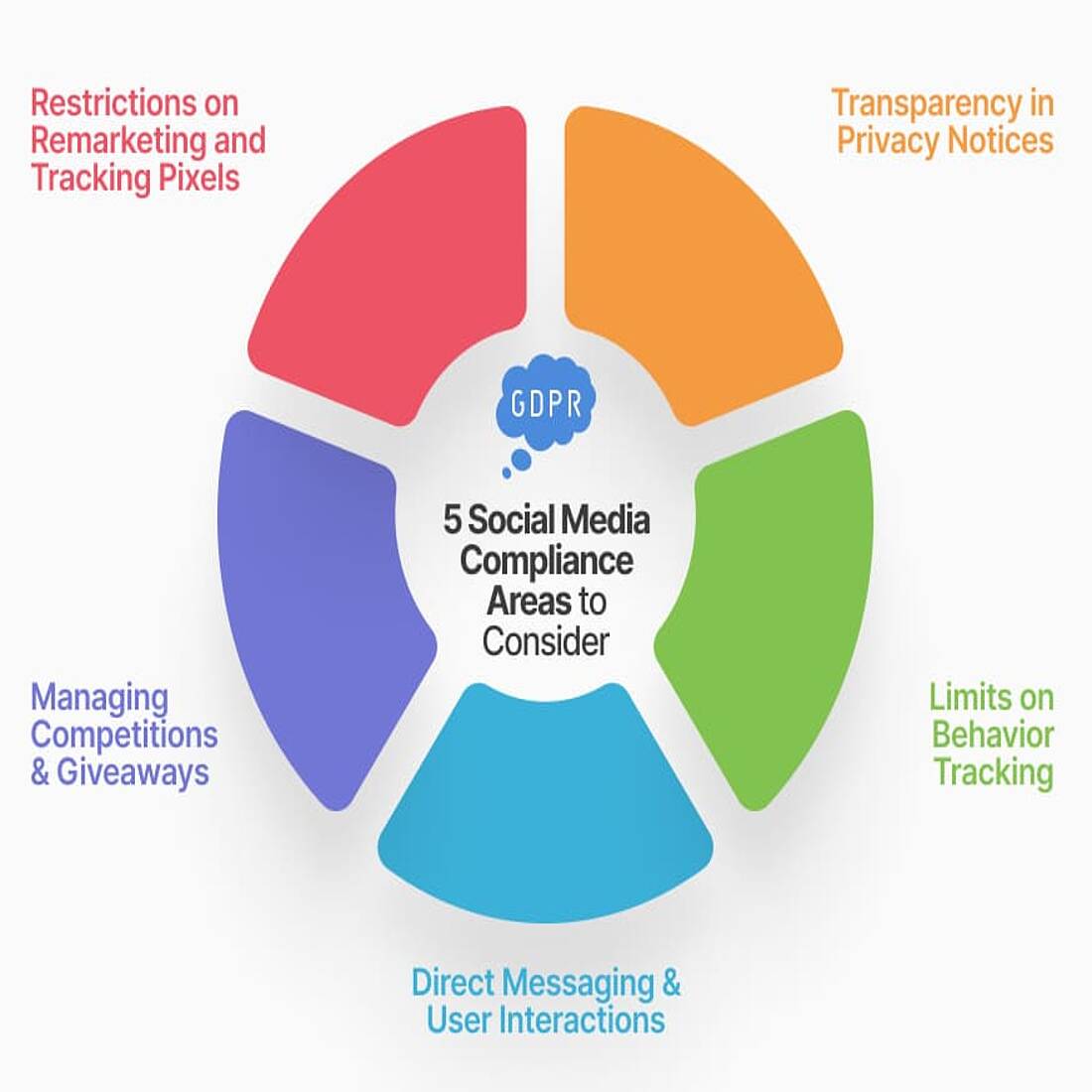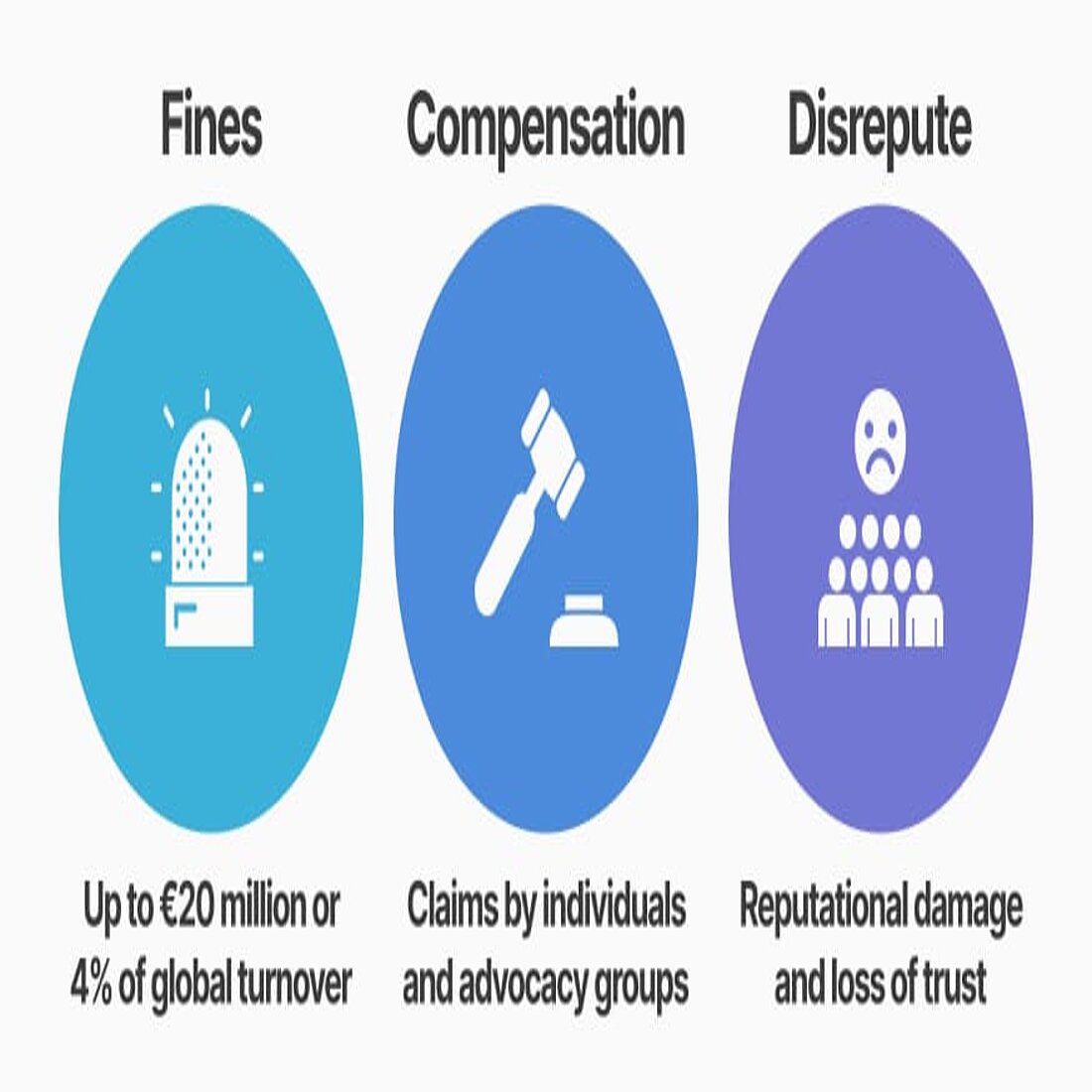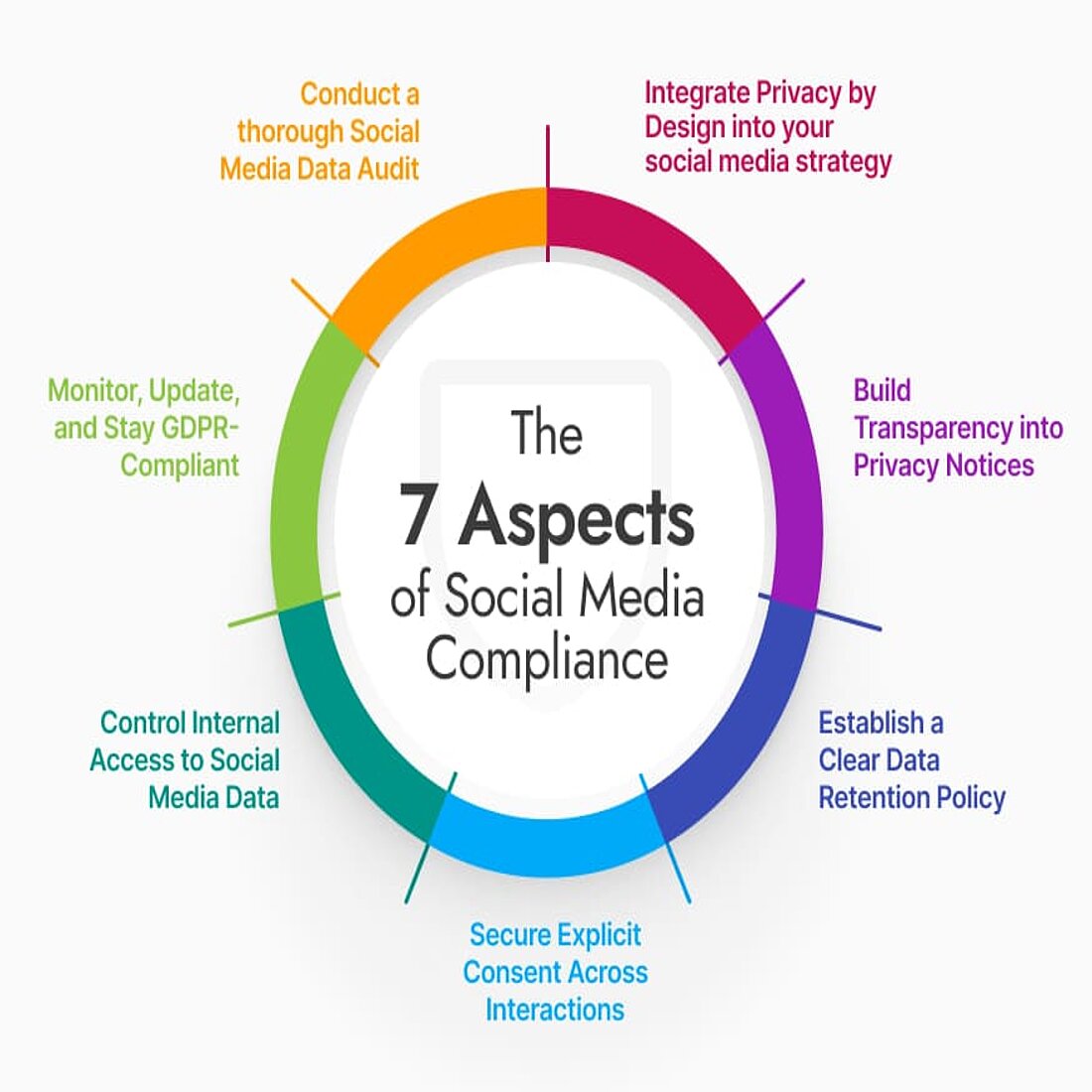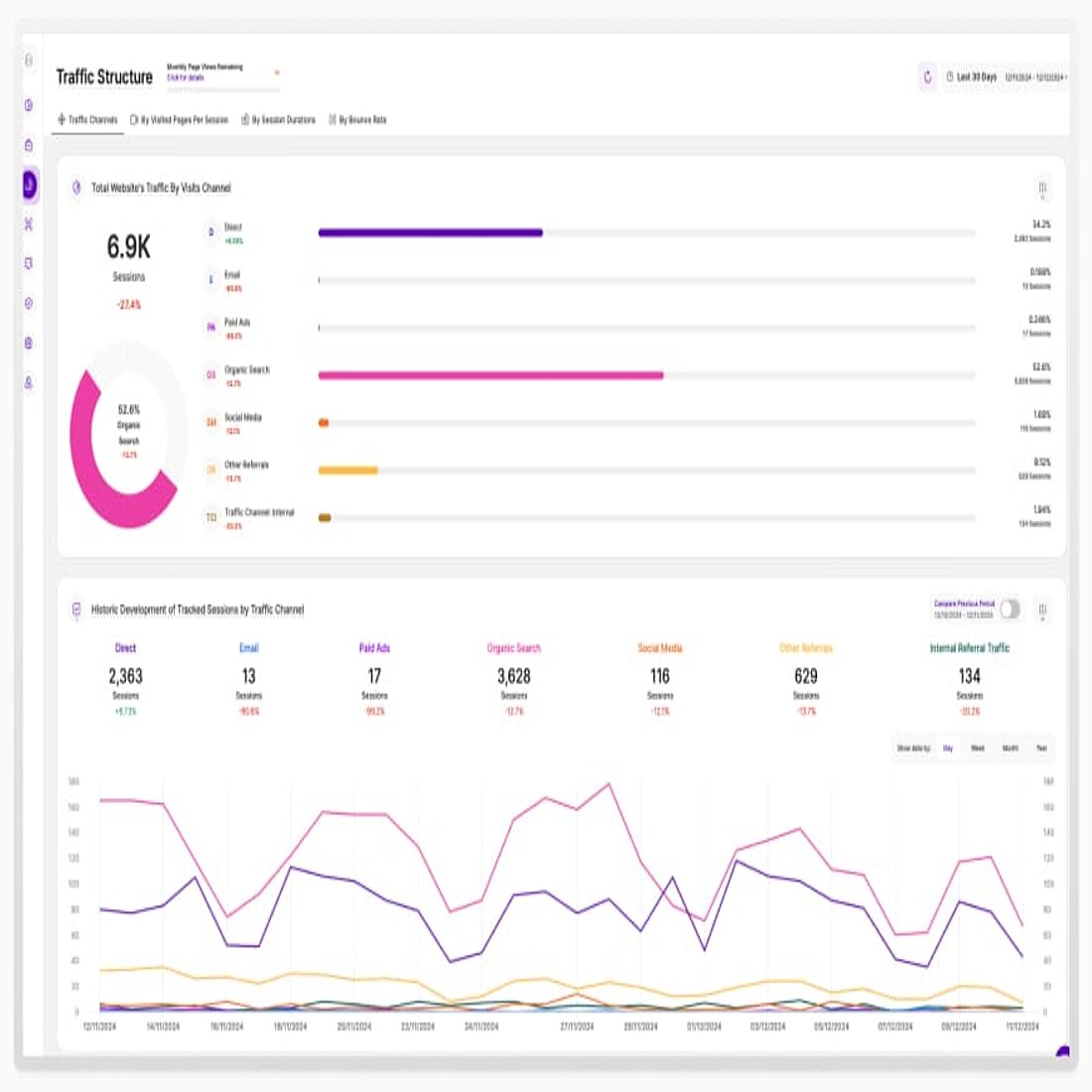- Why Us?
- Features
White Label
For SaaS Platforms & Agencies
Provide our complete analytics suite to your clients, directly within your own interface and with your/their own branding. Discover Analytics-as-a-Service and White Label Analytics. Great benefit, minimal effort.
- Pricing
- White Label
- Success Stories
- Partner
- ResourcesExpand Your Knowledge

Simon Coulthard December 18, 2024
11 min
CONTENTS
- What is GDPR?
- What are the GDPR Implications for Social Media Marketers?
- Respecting EU Citizen and Resident Rights
- Consent is Key
- 1. Remarketing Ads and Tracking Pixels
- 2. Transparency in Privacy Notices
- 3. Limits on User Behavior Tracking
- 4. Direct Messaging and User Interactions
- 5. Managing Competitions and Giveaways
- What Are the GDPR Penalties for Non-Compliance?
- How to Implement GDPR Compliance for Social Media
- Conduct a Social Media Data Audit
- Integrate Privacy by Design
- Build Transparency into Privacy Notices
- Establish a Clear Data Retention Policy
- Secure Explicit Consent Across Interactions
- Control Internal Access to Social Media Data
- Monitor, Update, and Stay GDPR-Compliant
- TWIPLA Can Help with GDPR Social Media Compliance
What is GDPR?
→ Protecting Privacy in the Social Media Era
The General Data Protection Regulation (GDPR) is a European Union law with a global reach - even impacting US companies.
It was designed to protect the personal data of EU citizens and residents.
Enforced in 2018, it reshaped how businesses collect, store, and use personal information, ensuring individuals have greater control over their data.
Social media platforms - like Facebook, YouTube, WhatsApp, and TikTok - are at the heart of modern communication and marketing strategies.
With 3.6 billion active users worldwide, these platforms offer a wealth of personal data that businesses leverage to target their audiences effectively. This number is expected to grow to 4.4 billion by 2025 (Statista).
However, GDPR social media regulations require businesses to handle user data responsibly - particularly when using it for advertising, tracking, or lead generation.
Companies now need explicit consent to collect or process personal data, including through tools like tracking pixels or cookies.
While social media remains one of the most powerful marketing tools - evidenced by $132 billion spent on ads in 2020 (Statista) - GDPR social media rules ensure that these activities respect privacy fundamentals.
This regulation sets a clear framework for marketers, shaping how businesses operate in this data-driven environment.
Respecting EU Citizen and Resident Rights
At the heart of GDPR are eight fundamental rights designed to protect the personal data of EU citizens and residents.
Social media marketers must ensure these rights are upheld when handling user information, including names, cookies, tracking pixels, and even data collected for advertising.
For marketers wondering how will GDPR affect social media, these rights outline the critical responsibilities when processing user data.
Here are the eight rights and what they mean in the context of social media marketing:
- The Right to Information
Users have the right to know what personal data is being collected, how it’s being processed, and for what purpose. Marketers must clearly communicate this in privacy policies and consent forms when gathering user data through social media campaigns. - The Right of Access
Users can request access to their personal data to see what information a company holds about them. For social media marketers, this means having systems in place to retrieve and share this data if a user requests it. - The Right to Rectification
If personal data is inaccurate or incomplete, users have the right to request corrections. For example, if a customer’s name or preferences were entered incorrectly via a lead form, marketers must update their records accordingly. - The Right to Erasure (The "Right to Be Forgotten")
Users can ask businesses to delete their personal data. For social media marketers, this applies to data collected through ads, lead magnets, or tracking tools like pixels, requiring its complete removal from internal systems. - The Right to Restriction of Processing
Users can request that companies limit the processing of their personal data. For instance, if a user disputes the accuracy of their data, marketers must stop using it until the issue is resolved. - The Right to Data Portability
Users have the right to request their data in a structured, machine-readable format and transfer it to another service. For marketers, this requires ensuring collected data - such as email sign-ups - is accessible and exportable if requested. - The Right to Object
Users can object to the processing of their personal data for certain activities, such as targeted advertising or profiling. If someone opts out of your marketing emails or ads, GDPR requires immediate compliance. - The Right to Avoid Automated Decision-Making
Users are protected from decisions made purely by automated systems (e.g., algorithms) that significantly affect them. For social media marketers, this means ensuring transparency in automated advertising systems and allowing users to request human intervention.
Handling Sensitive Data
In addition to these rights, GDPR designates certain categories of personal data as particularly sensitive - such as race, ethnicity, religion, and health information.
Social media marketers must apply heightened safeguards when handling this data, ensuring explicit consent is obtained before it’s processed or shared.
By respecting these rights and handling personal data with care, marketers not only stay compliant with GDPR but also build trust and transparency with their audiences.
Consent is Key
Explicit, opt-in consent is at the heart of GDPR compliance.
Internet users must actively agree to how their data is collected, stored, and used - consent cannot be implied through inactivity or pre-checked boxes.
While social media platforms like Facebook and LinkedIn typically manage consent through their privacy notices, social media and GDPR compliance becomes more critical when businesses extract and store personal data.
If marketers collect user data - such as through downloads, direct messaging, or lead-generation forms - they must secure explicit consent and clearly explain how the data will be processed or shared.
This also applies to GDPR social media posts, particularly when posts include identifiable personal information, such as names, images, or user-generated content.
Businesses must ensure they follow consent management best practices, and have the user’s consent before sharing or using such data for marketing purposes.
On the other hand, organic social media marketing remains unaffected.
Posting content, engaging with users, or tracking anonymized data - like follower counts or engagement rates - does not require personal data processing and avoids GDPR concerns.
The challenge for marketers lies in identifying where personal data is involved and ensuring their consent processes align with social media and GDPR compliance requirements at every step.
These principles directly impact social media marketing strategies in five key areas:
1. Remarketing Ads and Tracking Pixels
Remarketing ads are a staple of social media campaigns, allowing businesses to re-engage website visitors by serving tailored ads across platforms.
This relies on tracking pixels and cookies that collect user data to identify and retarget individuals.
Under GDPR, businesses must obtain explicit, opt-in consent for these tools. Visitors to your website must actively agree to being tracked, such as through the cookie consent banner demanded by EU legislation.
Without this consent, tracking pixels won’t fire, preventing users from being included in your remarketing campaigns.
Marketers must also disclose GDPR compliance at every stage of the marketing funnel, including how data will be used and stored.
The impact of these regulations is significant. GDPR compliance introduces additional steps to campaigns, which may disrupt the customer experience and reduce the number of leads generated.
Furthermore, without consent, marketers lose the ability to retarget previous website visitors on social media, limiting opportunities to re-engage valuable audiences.
This makes understanding the nuances of retargeting and remarketing even more important for marketers aiming to maintain GDPR compliance while maximizing campaign effectiveness.
2. Transparency in Privacy Notices
Capturing personal data - whether through lead generation ads, social media sign-up forms, or gated content downloads - requires full transparency under GDPR.
At the point of collection, businesses must provide users with a clear privacy notice that explains:
- What data is being collected (e.g., names, emails).
- How it will be processed, stored, and used.
- Whether it will be shared with third parties or used for additional purposes like remarketing.
Users must actively opt in to this data collection.
Pre-checked boxes are strictly non-compliant, and businesses may need a double opt-in process - first to confirm acceptance of the privacy notice and again to complete an action, such as accessing gated content.
While a privacy notice provides transparency at the point of collection, it should be supported by a broader social media policy GDPR compliance framework.
When created properly. this policy serves as a comprehensive document that outlines how your business handles personal data across all channels, including social media. For example, it should explain:
- How social media data (e.g., interactions, tracking pixels, or remarketing) is collected and used.
- Whether social media activity or tools share user data with third parties.
- Your legal basis for processing data from social media platforms.
Having a clear and accessible social media policy GDPR strategy ensures compliance while building trust with your audience.
It reassures users that their data - whether collected through websites, ads, or social media - is managed responsibly and transparently.
3. Limits on User Behavior Tracking
Social media analytics tools are essential for understanding audience engagement, tracking clicks, and analyzing conversions - particularly when monitoring the right social media metrics.
However, GDPR restricts behavior tracking without explicit consent, particularly when using cookies or tracking technologies.
If users decline cookies, businesses may experience gaps in their data, including metrics like website referral traffic, conversion paths, and on-site behavior.
This loss of visibility can make it difficult to measure the success of social media campaigns or make data-driven decisions.
To address this, businesses have increasingly turned to cookieless tracking solutions.
These technologies allow marketers to monitor user behavior in a GDPR-compliant way without relying on cookies or explicit consent. Platforms like TWIPLA offer advanced, cookieless analytics that ensure 100% traffic visibility while respecting user privacy.
By adopting cookieless tracking and clearly explaining how user data is used, businesses can maintain compliance, improve data accuracy, and continue optimizing their social media strategies.
4. Direct Messaging and User Interactions
Direct messaging on social media - whether through Facebook Messenger, Instagram DMs, or LinkedIn InMail - has emerged as a powerful tool for personalized marketing and customer engagement.
However, GDPR applies to any personal data collected during these conversations, including user names, chat histories, and contact details.
To ensure compliance, businesses must:
- Obtain explicit consent before storing, processing, or using this data for follow-ups, marketing outreach, or any other purpose.
- Provide transparency by informing users why their data is being collected and how it will be used.
- Avoid sharing direct messages or personal details with third-party tools, CRMs, or automation systems unless clear consent has been secured.
For example, if a customer requests product information via Instagram DMs, and you plan to add their email to a CRM for further updates, you must first request and document their consent.
This ensures your practices align with GDPR requirements while respecting user privacy.
Treating direct messaging interactions responsibly goes beyond legal compliance - it helps build trust and demonstrates a commitment to user privacy.
Businesses that prioritize transparency in these conversations will not only meet GDPR standards but also strengthen customer relationships and brand reputation.
5. Managing Competitions and Giveaways
Social media contests and giveaways are a popular way to boost engagement and grow your audience.
However, they often require users to submit personal information, such as names, emails, or phone numbers, which makes GDPR compliance essential.
To meet GDPR requirements, businesses must:
- Clearly explain how the collected data will be used, stored, and whether it will be shared with third parties.
- Obtain explicit consent for each specific use case, such as adding participants to a newsletter or sharing their information with partners.
Crucially, blanket consent cannot be assumed for future communications.
For example, if someone enters a giveaway, separate opt-in consent is required to send them promotional emails afterward.
A compliant process might include: a clear privacy notice at the point of entry, an opt-in checkbox for additional communications, and transparency about how the data will be managed.
By ensuring GDPR-compliant practices in competitions, businesses can not only avoid penalties but also foster trust and loyalty among their audience.
A transparent approach reassures participants that their data is being handled responsibly, turning a simple giveaway into an opportunity to build stronger customer relationships.
What Are the GDPR Penalties for Non-Compliance?
Failing to comply with GDPR can result in severe penalties, both financially and reputationally.
To encourage businesses to take data protection seriously, GDPR imposes a two-tier fine system based on the severity of the breach:
- Tier 1: Fines of up to €10 million or 2% of the company’s annual global revenue from the previous year, whichever is higher. This applies to less severe breaches, such as failure to maintain accurate records or implement adequate privacy safeguards.
- Tier 2: Fines of up to €20 million or 4% of the company’s annual global revenue, whichever is higher. This tier covers the most serious violations, such as unlawful data processing, failure to obtain consent, or infringing upon users' fundamental data rights.
The financial penalties alone can be catastrophic, especially for small and medium-sized businesses, but the impact doesn’t stop there.
Reputational damage is often far worse, as non-compliance erodes user trust and harms long-term relationships with customers.
For social media marketers, GDPR social media compliance is essential.
There’s no room for shortcuts when handling personal data on platforms that rely heavily on user engagement and targeting.
Transparency, clear consent, and adherence to GDPR principles are not just legal requirements - they are key to protecting your brand’s reputation and maintaining customer confidence.
Conduct a Social Media Data Audit
Start by reviewing all processes where personal data is collected, shared, or stored through social media platforms. Map out how data flows within your business:
- What data do you collect (e.g., names, emails, tracking pixels)?
- Where does this data come from - ads, lead forms, direct messages, or tracking tools?
- Who has access to this data, and where is it stored?
Identify any areas of concern, such as outdated permissions or unclear data usage. This audit provides a clear picture of your current compliance status and highlights areas needing improvement.
Integrate Privacy by Design
Make user privacy a priority at every stage of your social media strategy, from campaign planning to data management.
Under GDPR, businesses are required to embed privacy into their operations by default. In practice, this means:
- Collecting only the data you truly need for a specific purpose.
- Implementing safeguards like encryption or access controls to protect user information.
- Regularly assessing risks and ensuring new tools or processes meet GDPR requirements.
By integrating Privacy by Design, you demonstrate a proactive commitment to safeguarding user data.
Build Transparency into Privacy Notices
Transparency is critical when collecting data on social media.
Whether you’re running lead generation ads, collecting sign-ups, or using tracking tools, you must provide a clear privacy notice at the point of data collection.
This notice should include:
- What data is being collected.
- How it will be used, stored, or shared.
- Any additional purposes, such as remarketing or third-party transfers.
Privacy notices should be concise, accessible, and easy to understand - free from jargon. Users need to know exactly how their data will be handled before they give consent.
Establish a Clear Data Retention Policy
Under GDPR, businesses must not store personal data longer than necessary.
For social media marketers, this means defining how long user data collected through campaigns, ads, or direct interactions will be retained and ensuring it's securely deleted afterward.
Steps to achieve this include:
- Setting clear time limits for retaining data, such as lead information or contest entries.
- Regularly auditing stored data to identify and delete outdated or unnecessary records.
- Communicating retention periods in your privacy notices to maintain transparency with users.
By implementing a clear data retention policy, businesses reduce compliance risks, streamline their processes, and demonstrate accountability to their audiences.
Secure Explicit Consent Across Interactions
GDPR requires businesses to obtain explicit, opt-in consent whenever personal data is collected. For social media marketers, this includes:
- Sign-up forms, lead generation ads, or gated content downloads.
- Competitions and giveaways requiring personal details.
- Using direct messages to extract and store user data for follow-ups.
- Introduce GDPR training so all employees understand their compliance responsibilities.
Additionally, marketers must consider the implications of GDPR photos on social media, as images that include identifiable individuals also qualify as personal data.
Sharing or using photos for campaigns without explicit consent can violate GDPR regulations, making it essential to obtain permission beforehand.
Ensure consent is deliberate - no pre-ticked boxes or assumptions. If you plan to use the data for additional purposes, like newsletters or remarketing, request separate consent for each activity.
By prioritizing clarity and choice, you keep your processes compliant, protect user rights, and build trust with your audience.
Control Internal Access to Social Media Data
Restricting internal access to social media data is essential for GDPR compliance. To minimize risks:
- Assign specific roles and responsibilities for managing social media campaigns and user data.
- Secure login credentials and avoid sharing them among employees.
- Limit access to personal data within your organization on a need-to-know basis.
Implementing these controls reduces the chance of unauthorized data access, ensuring compliance and protecting user information.
Monitor, Update, and Stay GDPR-Compliant
GDPR for social media isn’t a one-time task - it’s an ongoing process. To stay compliant, businesses should:
- Regularly review and update their social media data processes.
- Test cookie opt-in mechanisms to ensure users can give informed consent.
- Update privacy notices or consent forms whenever campaigns or tools change.
As data privacy regulations continue to evolve, staying proactive helps businesses adapt and maintain compliance while strengthening customer trust. By treating GDPR for social media as an ongoing priority, marketers can ensure their strategies remain effective, transparent, and aligned with user privacy expectations.
Share article
Get Started for Free
Gain World-Class Insights & Offer Innovative Privacy & Security

You might also like
Are Chatbots GDPR Compliant & Which Options are Best? 16 February 2022 - by Simon Coulthard
16 February 2022 - by Simon Coulthard
10 Top GDPR Compliant Survey Platforms 14 February 2022 - by Simon Coulthard
14 February 2022 - by Simon Coulthard















